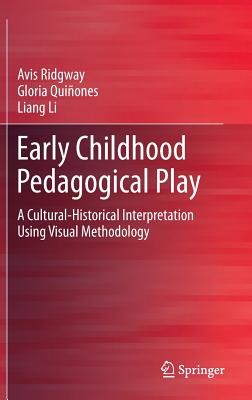
- We will send in 10–14 business days.
- Author: Avis Ridgway
- Publisher: Springer
- Year: 2015
- Pages: 185
- ISBN-10: 9812874747
- ISBN-13: 9789812874740
- Format: 15.6 x 23.4 x 1.3 cm, hardcover
- Language: English
- SAVE -10% with code: EXTRA
Reviews
Description
This book re-theorizes the relationship between pedagogy and play. The authors suggest that pedagogical play is characterized by conceptual reciprocity (a pedagogical approach for supporting children's academic learning through joint play) and agentic imagination (a concept that when present in play, affords the child's motives and imagination a critical role in learning and development). These new concepts are brought to life using a cultural-historical approach to the analysis of play, supported in each chapter by visual narratives used as a research method for re-theorising play as a pedagogical activity. Whenever a cultural-historical approach is applied to understanding pedagogical play, the whole context of the playful event is always included. Further, the child's cultural environment is taken into account in order to better understand their play. Children from different countries play differently for many reasons, which may include their resources, local cultural beliefs about play and specific pedagogical practices. The inclusion and acknowledgement of social, cultural and historical contexts gives credence and value to understanding play from both child and adult perspectives, which the authors believe is important for the child's learning and development. As such, the relationships that children and adults have with human and non-human others, as well as any connections with artefacts and the material environment, are included in all considerations of pedagogical play.
EXTRA 10 % discount with code: EXTRA
The promotion ends in 16d.22:22:26
The discount code is valid when purchasing from 10 €. Discounts do not stack.
- Author: Avis Ridgway
- Publisher: Springer
- Year: 2015
- Pages: 185
- ISBN-10: 9812874747
- ISBN-13: 9789812874740
- Format: 15.6 x 23.4 x 1.3 cm, hardcover
- Language: English English
This book re-theorizes the relationship between pedagogy and play. The authors suggest that pedagogical play is characterized by conceptual reciprocity (a pedagogical approach for supporting children's academic learning through joint play) and agentic imagination (a concept that when present in play, affords the child's motives and imagination a critical role in learning and development). These new concepts are brought to life using a cultural-historical approach to the analysis of play, supported in each chapter by visual narratives used as a research method for re-theorising play as a pedagogical activity. Whenever a cultural-historical approach is applied to understanding pedagogical play, the whole context of the playful event is always included. Further, the child's cultural environment is taken into account in order to better understand their play. Children from different countries play differently for many reasons, which may include their resources, local cultural beliefs about play and specific pedagogical practices. The inclusion and acknowledgement of social, cultural and historical contexts gives credence and value to understanding play from both child and adult perspectives, which the authors believe is important for the child's learning and development. As such, the relationships that children and adults have with human and non-human others, as well as any connections with artefacts and the material environment, are included in all considerations of pedagogical play.


Reviews